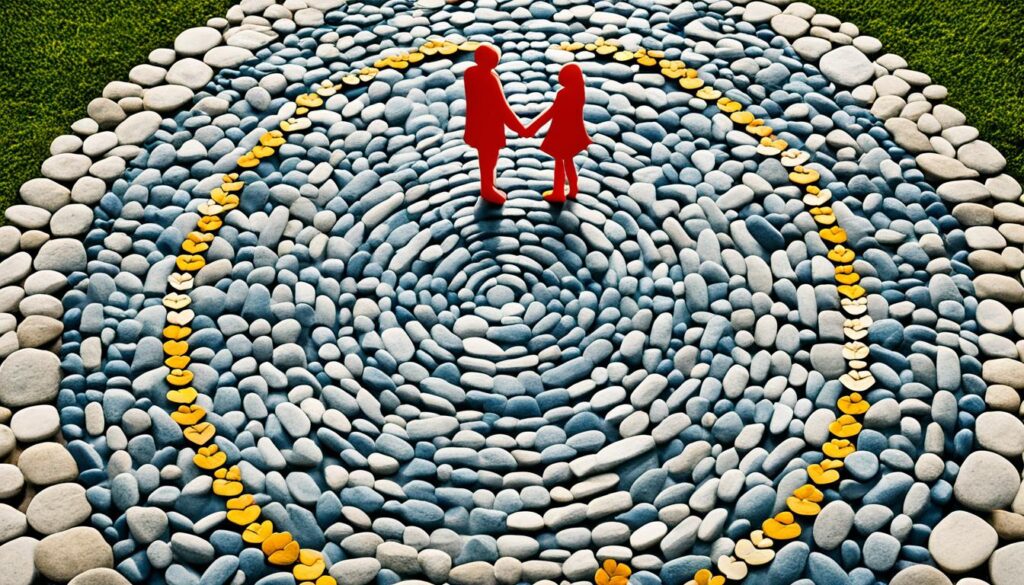The 5 Stepping Stones in a Healthy Relationship
According to the American Academy of Pediatrics, dating typically starts at 12.5 years old for girls and 13 years old for boys. While dating at a young age may look different than dating as adults, our exposure to romantic relationships starts early and is an important aspect of our lives. Whether a relationship begins in the first year of college or in one’s mid-forties, it will go through the five universal relationship stages. Being in a relationship doesn’t always feel like being on cloud nine – some stages are not easy. That’s why it’s important to have strong stepping stones in a relationship.
Key Takeaways
- Dating typically starts at 12.5 years old for girls and 13 years old for boys, according to the American Academy of Pediatrics.
- Romantic relationships go through five universal stages, regardless of when the relationship begins.
- Having strong stepping stones is crucial for navigating the ups and downs of a relationship.
- The five stepping stones in a healthy relationship are Trust, Communication, Teamwork, Comprehension, and Wholehearted Love.
- Establishing a strong emotional connection is the foundation for building a lasting, healthy relationship.
Understanding Relationship Stages
Navigating the complex and dynamic journey of a relationship requires an understanding of the distinct stages that couples typically experience. From the initial Honeymoon Phase to the ultimate True Love and Acceptance, each stage brings its own unique challenges and opportunities for growth.
The Honeymoon Phase
The Honeymoon Phase is the early, exciting stage of a relationship when everything feels new and exhilarating. Both partners are infatuated with each other, only seeing the positive qualities and overlooking any imperfections. This feel-good stage is fueled by the release of hormones like dopamine and oxytocin, creating a happy, lovey-dovey atmosphere. However, this phase is temporary and cannot last forever.
Doubts and Insecurities
As the relationship progresses, the Doubts and Insecurities stage follows. During this phase, partners start to see each other’s flaws and imperfections, which can lead to doubts about the long-term potential of the relationship. Couples need to put in serious work through compromises, open communication, and a willingness to address these concerns head-on.
Stability and Routine
If couples successfully navigate the Doubts and Insecurities stage, they may enter the Stability and Routine stage, where they are content and satisfied with each other. However, it’s crucial for partners to not fall into a monotonous routine and to continue nurturing the romantic aspects of their relationship.
Decision and Action
The next stage, Decision and Action, is a critical juncture where couples must evaluate the future of their relationship and make crucial decisions about commitment. This stage requires deep introspection and a willingness to commit to the long-term potential of the partnership.
True Love and Acceptance
Finally, the True Love and Acceptance stage is when couples have weathered the storms of the previous stages and have arrived at a place of mutual understanding and unconditional love. At this stage, partners fully accept each other’s imperfections and are committed to building a lifelong bond.
Understanding these five distinct stages of a relationship is essential for couples to navigate the journey of love successfully. By recognizing the ebbs and flows of their partnership, they can better prepare for the challenges and opportunities that lie ahead, ultimately leading to the building of a healthy and lasting relationship.
5 Stepping Stones in a Relationship
To navigate the journey of love successfully, it’s crucial to understand the five key 5 Stepping Stones in a Relationship. These stepping stones represent significant milestones that couples experience as they progress and develop their bond. Each stage brings its own challenges and lessons, ultimately leading to the building of a healthy and lasting relationship.
Whether you’re just starting a new relationship or have been together for years, recognizing and addressing these critical stepping stones can help you and your partner strengthen your connection and create a foundation for a fulfilling, lifelong partnership.
“The stages of a relationship are not always linear and may overlap or repeat in various ways for each couple.”
By understanding and navigating these 5 Stepping Stones in a Relationship, you can foster a deeper connection, trust, and commitment with your partner, ultimately leading to a healthy and satisfying relationship.
Remember, building a Healthy Relationship is a continuous journey, and each couple’s path will be unique. By embracing these stepping stones and putting in the necessary effort, you can create a strong, lasting bond that weathers the ups and downs of life together.
Trust: The Foundation of Connection
Trust is the first stepping stone in a relationship and the foundation upon which a strong bond is built. Trust in relationships is crucial, as it ensures feelings of security and happiness, helping couples overcome challenges in every relationship stage. To build this essential foundation, partners need to focus on building trust through honesty and by respecting each other’s boundaries and privacy.
Building Trust Through Honesty
Honesty is the cornerstone of building trust in relationships. When partners are open and truthful with one another, it fosters a sense of security and reliability. By cultivating a culture of honesty in relationships, couples can establish a strong emotional connection and create an environment where they feel safe to be vulnerable with each other.
Respecting Boundaries and Privacy
Equally important to building trust is respecting each other’s boundaries and privacy. Maintaining healthy boundaries, both physical and emotional, demonstrates mutual care and consideration. Partners who respect each other’s personal space and give each other the freedom to be themselves are more likely to develop a deep sense of trust and understanding.
When partners develop mutual trust in relationships, it lays the groundwork for a lasting and fulfilling connection. By prioritizing honesty and respecting each other’s boundaries, couples can cultivate a strong foundation that supports them through every stage of their relationship journey.
Communication: The Key to Understanding
Effective communication is the second stepping stone in a healthy relationship. Arguments often arise from misunderstandings, and resentment can accumulate from a lack of communication and commitment. Having open and honest conversations to share thoughts, emotions, and feelings is crucial for couples to resolve conflicts and strengthen their bond.
Active Listening Skills
Developing active listening skills is essential for communication in relationships. Partners must actively listen to each other, empathize, and seek to understand each other’s perspectives. This allows them to address concerns, clarify misunderstandings, and find mutually agreeable solutions.
Expressing Emotions Openly
The ability to express emotions openly is another key aspect of communication in relationships. Partners should feel comfortable sharing their feelings, whether it’s joy, frustration, or anything in between. This vulnerability and honest exchange of emotions helps build intimacy and strengthens the relationship.
Teamwork: Facing Challenges Together
The third stepping stone in a fulfilling Relationship Teamwork is the ability to face challenges together as a team. In any relationship, there will be obstacles and difficulties that arise, but the true strength of the partnership lies in how the couple navigates these hurdles. By working collaboratively and supporting each other through Facing Challenges Together, partners can overcome adversity and grow closer in the process.
Successful couples understand that they are on the same team, with a shared goal of nurturing and strengthening their bond. When faced with a problem, they approach it as partners, combining their skills, resources, and problem-solving abilities to find a solution. This teamwork mentality fosters a sense of unity, trust, and mutual respect, allowing the relationship to weather any storm.
Maintaining a Relationship Teamwork mindset involves effective communication, compromise, and a willingness to support each other’s needs. Partners must be willing to listen, empathize, and find common ground, even in the face of disagreements. By embracing a collaborative approach, couples can navigate difficulties together, share in both joys and sorrows, and emerge from challenges with a stronger, more resilient relationship.
Ultimately, the third stepping stone of Relationship Teamwork and Facing Challenges Together is a crucial component of a healthy, long-lasting partnership. By fostering a team-oriented mindset and prioritizing joint problem-solving, couples can overcome obstacles and deepen their emotional connection, setting the stage for a fulfilling and enduring relationship.
Comprehension: Seeing From Your Partner’s Perspective
The fourth stepping stone in a healthy relationship is comprehension – the ability to empathize with your partner’s situation and truly understand their perspective. This involves developing empathy and compassion, as well as learning each other’s love languages. By putting yourself in your partner’s shoes, you can avoid misunderstandings and strengthen your mutual understanding.
Empathy and Compassion
Empathy is the cornerstone of meaningful connections. When you can empathize with your partner’s experiences and emotions, you create a deeper bond and foster a stronger sense of understanding. Cultivating compassion – the desire to alleviate your partner’s suffering – further reinforces this emotional intimacy. Research has shown that having empathy in a romantic relationship is essential for building deeper bonds.
Understanding Love Languages
In 1992, Dr. Gary Chapman developed the concept of love languages, which are the primary ways individuals feel loved and appreciated. By understanding each other’s love languages, couples can better predict and meet each other’s emotional needs, leading to increased connection and feelings of closeness. The five love languages are: Words of Affirmation, Acts of Service, Receiving Gifts, Quality Time, and Physical Touch. Recognizing your partner’s love language and expressing your own can significantly enhance relationship health and improve overall understanding of your partner’s perspective.
As the data suggests, comprehending your partner’s perspective is a crucial stepping stone in building a healthy, lasting relationship. By cultivating empathy, compassion, and understanding each other’s love languages, couples can navigate challenges, avoid misunderstandings, and strengthen the emotional connection that is the foundation of their bond.
5 Stepping Stones in a Relationship
Maintaining a happy and healthy relationship requires continuous effort, communication, and understanding from both partners. Couples need to nurture their relationship by putting in the necessary work, such as planning romantic dates and activities to keep the romance alive.
Nurturing Your Relationship
Relationships thrive when both partners actively work towards a committed future. This involves regularly checking in with each other, expressing gratitude, and making efforts to nurture the relationship. Small gestures like surprise date nights, thoughtful gifts, or simply spending quality time together can go a long way in strengthening the bond.
Keeping the Romance Alive
As a relationship progresses, it’s easy to fall into a comfortable routine. However, it’s important for couples to make a conscious effort to keep the romance alive. This could include planning adventurous activities, exploring new hobbies together, or simply reminiscing about the early days of their relationship. Maintaining that spark and excitement is crucial for keeping the relationship vibrant and fulfilling.
The Emotional Connection
The first stepping stone in a relationship is the emotional connection, which establishes intimacy and bonding between partners. This involves not just physical or sexual intimacy, but also emotional and spiritual intimacy. As couples spend time together and become vulnerable, they form a deep connection that serves as the foundation for their relationship.
Intimacy and Bonding
Developing a strong emotional connection is crucial for building a lasting and fulfilling relationship. When partners prioritize emotional closeness, they create an unbreakable bond that helps them navigate the ups and downs of their journey together. This emotional intimacy fosters a sense of trust, safety, and understanding, laying the groundwork for a truly healthy and intimate relationship.
Emotional and Spiritual Intimacy
Beyond physical intimacy, couples must also cultivate emotional and spiritual intimacy. This involves sharing their deepest thoughts, feelings, and vulnerabilities with one another, creating a profound sense of connection that transcends the physical. When partners can openly express their emotions, empathize with each other, and find a deeper meaning in their bond, they establish a foundation of Emotional Connection in Relationships that can withstand the test of time.
Identifying and Overcoming Insecurities
As partners become more familiar with each other, they start to unveil their vulnerabilities and flaws, which can lead to doubts and insecurities. This critical second stepping stone in a relationship requires empathy, understanding, and a willingness to address underlying doubts and fears.
Recognizing Doubts and Fears
Insecurities often manifest in the form of control issues, jealousy, and negative self-talk. Couples must be willing to openly discuss these doubts and fears and offer support and reassurance to each other. By recognizing the root causes of their insecurities, partners can work together to navigate this challenging stage and build a stronger, more resilient relationship.
Building Self-Confidence
Ultimately, overcoming insecurities requires a focus on building self-confidence. Through self-reflection, positive affirmations, and a commitment to personal growth, individuals can learn to embrace their imperfections and develop a more positive self-perception. As partners support each other in this journey, they can cultivate the inner peace and self-assurance necessary to sustain a healthy, long-lasting relationship.

Disillusionment and Disappointment
The third stepping stone in a relationship is marked by disillusionment and disappointment. As partners become more familiar with each other, they may start to notice certain behaviors or personality traits that they find frustrating or incompatible. This can lead to an increase in conflicts and arguments, as the rose-colored glasses of the initial honeymoon phase begin to fade.
Navigating Conflicts and Arguments
During this challenging stage, it is crucial for couples to address these issues openly and honestly. Navigating conflicts and finding effective ways to communicate and resolve disagreements is essential for strengthening the relationship. Partners need to approach these conversations with empathy, understanding, and a willingness to compromise in order to overcome the disappointment they may be feeling.
Practicing Gratitude and Love
Alongside addressing conflicts, practicing gratitude and love can also be a powerful tool in this stage. By focusing on the positive aspects of the relationship and expressing appreciation for one another, couples can shift their mindset and maintain a sense of perspective during the more turbulent times. This can help them stay grounded and remind them of the foundation of love and commitment that brought them together in the first place.
The Decision to Commit or Break Up
The fourth stepping stone in a relationship is the pivotal decision to commit or break up. At this stage, partners must carefully evaluate the future of their relationship and make a conscious choice about their commitment to each other. This decision requires introspection and can be a critical point in determining the long-term potential of the relationship.
Evaluating the relationship’s future involves assessing the depth of the emotional connection, the level of trust and communication, and the ability to work through challenges as a team. Partners must honestly reflect on whether they see a shared vision for the future and if they are willing to put in the necessary effort to overcome any obstacles.
Making a conscious choice about the relationship’s direction is not an easy task, but it is a necessary step in ensuring the relationship’s long-term success. Couples must carefully weigh the pros and cons, consider their individual and shared goals, and make a decision that aligns with their values and desires for the future.
Whether the choice is to commit to a deeper level of partnership or to part ways, this stepping stone represents a critical juncture in the relationship’s journey. By approaching this decision with honesty, open communication, and a willingness to compromise, couples can navigate this pivotal moment and move forward, either strengthening their bond or discovering a new path that better serves their individual needs.
Wholehearted Love and Acceptance
As couples navigate the earlier stepping stones of a relationship, they ultimately arrive at the pinnacle of wholehearted love and acceptance. This final stage represents the culmination of their journey, where partners have weathered the challenges and complexities of the previous milestones and now embrace each other’s imperfections with unwavering commitment.
Unconditional Love and Support
At this stage, unconditional love and unwavering support become the foundation of the relationship. Partners have developed a deep understanding and appreciation for one another, recognizing that no one is perfect. They commit to building a lifelong bond, standing by each other through thick and thin, and providing the emotional security that nurtures true intimacy.
Embracing Imperfections
The essence of wholehearted love is the ability to fully accept and embrace each other’s imperfections. Couples in this stage have learned to let go of unrealistic expectations and instead celebrate the unique qualities that make their partner who they are. They understand that a healthy relationship is not about perfection, but about accepting imperfections and cherishing the person as a whole.

The journey through the five stepping stones of a relationship is not always easy, but it is a testament to the power of love, commitment, and mutual understanding. By embracing the final stage of wholehearted love and acceptance, couples can build a lifelong bond that withstands the test of time and celebrates the beauty in each other’s flaws.
Conclusion
Understanding the 5 Stepping Stones in a Relationship is essential for fostering growth and progression. Each milestone represents a different phase in the journey of a partnership, and navigating through these steps requires effort, communication, and understanding from both partners. By nurturing their relationship and building a strong foundation of trust, communication, teamwork, comprehension, and wholehearted love, couples can create a stable and lasting bond.
The 5 Stepping Stones in a Relationship serve as a roadmap for couples to navigate the complexities of their partnership. From establishing trust and effective communication to developing mutual respect and emotional intimacy, each stepping stone represents a critical element in building a healthy relationship. By embracing these milestones and putting in the necessary work, couples can overcome challenges, deepen their connection, and cultivate a lifelong bond.
Ultimately, the journey of a relationship is not without its ups and downs, but by understanding and embracing the 5 Stepping Stones, couples can navigate these stages with greater clarity, empathy, and commitment. The result is a strong, fulfilling partnership that withstands the test of time and brings immense joy and satisfaction to both partners.







